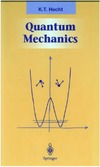Intended for a first-year graduate course in quantum mechanics, this text provides a thorough introduction to the subject.
The first half of the book emphasizes bound-state problems. It begins with the familiar approach via differential equations and coordinate representations. A discussion of the factorization method and ladder operators for solving the eigenvalue problem leads naturally to the modern algebraic approach. Part II treats time-independent perturbation theory. The role of symmetry breaking in removing degeneracies is emphasized, but cases in which the first-order perturbation does not lead to the proper symmetry-adapted basis are also treated. Part III provides a detailed discussion of rotational symmetry and angular momentum, including discussions of the Wigner-Eckart theorem, the matrix elements of the general rotation operator and of vector-coupled tensor operators in terms of angular momentum recoupling coefficients. It includes a chapter on the SO(2,1) algebra of a stretched Coulomb basis that avoids the infinite sum and continuum contributions of conventional perturbation treatments. Part IV provides an introduction to systems of identical particles.
The second half deals chiefly with continuum problems: scattering theory, including rearrangement collisions; a discussion of density matrices and statistical distributions of states; time-dependent perturbation theory, and atom-photon interactions, including the full multipole expansion of the quantized electromagnetic field. The book concludes with the Dirac theory of spin 1/2 particles and an introduction to many-body theory using annihilation-creation operator formalism.
The text is self-contained and can be used by students without a previous course in quantum mechanics. Numerous problems are an integral part of the text, guiding and testing the reader's understanding.
 |
|
О проекте
|
|
О проекте


